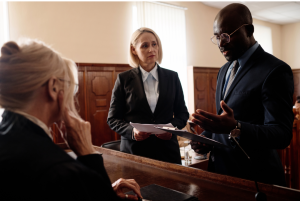The majority of attorneys rarely appear in a courtroom or engage in litigation. Those who advertise themselves as litigators may actually be pre-trial litigators and either settle their cases before trial or refer the case to another attorney who tries the case. Few attorneys have the experience needed to adequately try a case in court, and when they do, they may commit vital errors that undermine their client’s case, leading to disastrous results.
 What is Litigation?
What is Litigation?
Litigation in civil cases begins when a Complaint is filed in Court. Was it the right Court? And timely filed? At this stage, the discovery process begins. Discovery involves the exchange of information and the identification of evidence that supports each party’s position, forcing the other party to prove how their version of facts or the law will prevail. A litigation attorney must do a thorough job in conducting discovery, or she and her client will be at a considerable disadvantage when the trial begins – and will not be in a strong position to resolve the case without trial. Discovery consists of:
- Submitting written questions or interrogatories to the opposing parties
- Deposing the other party, witnesses, and experts
- Subpoenaing documents and serving a Request for Production of Documents on the opposing party
- Serving a Request for Admissions
A litigation attorney will analyze the information obtained and construct a strategy for further handling of the case, preparing for trial, or seeking a settlement before trial.
Litigation Errors
Litigation errors can occur during the pre-trial phase that can damage a client’s case and may constitute negligence. Some common litigation errors are:
- Missing deadlines. A court will set dates for when all motions must be filed, when experts must be disclosed, when to file objections or responses to discovery, and when to submit certain documents or appear for pre-trial appearances. Failing to meet these deadlines can result in an inability to obtain key facts and evidence, to engage experts, or to object to disclosing irrelevant and damaging evidence to the opposing party. In some cases, a court may dismiss the claim or throw out causes of action. This happens in all types of cases but particularly personal injury, divorce and probate.
- Conducting poor discovery—key questions must be asked of the other party, relevant documents must be obtained, and parties and witnesses must be deposed to pin down testimony and to form a strategy for how to prosecute the case. New parties may also be identified and included in the case, which can increase the claim’s value.
- Not conducting an in-depth investigation. In tort (personal injury) cases, it may necessary to visit the accident scene, have an expert conduct a study of how the incident occurred, identify and question witnesses, and uncover previously unknown facts. It is certainly necessary to find photos and videos.
- Not conducting the necessary legal research. Knowing the law will steer an attorney towards what facts are needed to prove each element of a case and the strategy needed to prove or disprove the elements at trial, or to survive a motion for summary judgment.
Trial Errors
Should your case proceed to trial, and your attorney is inexperienced or ill-prepared, his incompetence will often become evident at the outset. A rambling opening statement that leaves jurors, the judge, and the client baffled does not portend well for a satisfactory outcome. Other key trial errors are:
- Failing to object to irrelevant evidence
- Not objecting to hearsay evidence that directly harms the case
- Not knowing how to introduce evidence at trial or how to object to evidence that lacks foundation
- Not conducting an adequate voir dire of an expert witness whose qualifications should have been questioned or whose testimony should not have been allowed
- Conducting a poor cross-examination of an opposing witness
- Not conducting an adequate direct examination of a key witness, which results in not being able to prove an element of the claim and risks dismissal of the cause of action
- Strategic errors in conducting voir dire, choosing witnesses, tying the evidence together, and arguing the facts and law
Not all attorney incompetence at trial will lead to a legal malpractice claim, regardless of how egregious it may appear. Your legal malpractice attorney must show that but for the attorney’s lack of preparation, inexperience, or general inability to prosecute or defend a case, your case would have turned out differently.
Also, the underlying claim must have had merit where a reasonably competent attorney under similar circumstances would more than likely have prevailed, absent the attorney’s incompetent handling. In these cases, your legal malpractice attorney may need to try the underlying claim before a jury or judge and obtain a favorable outcome, where your case and damages are proven.
Consult a Legal Malpractice Attorney from Burns and Jain
Receiving an adverse result in a claim that had substantial merit may well have been the fault of your trial attorney. A legal malpractice attorney will examine the court record, transcripts, and all discovery documents and determine whether you have a claim for legal malpractice. Call our office for an in-depth consultation about your possible claim.
